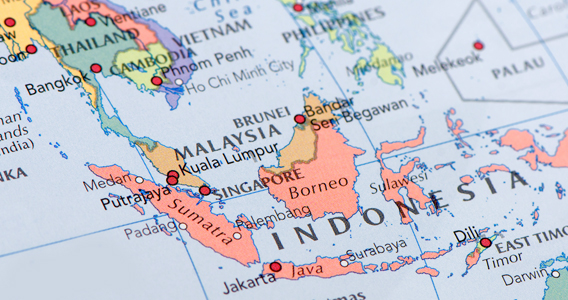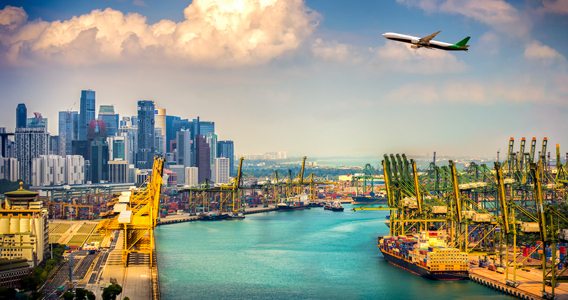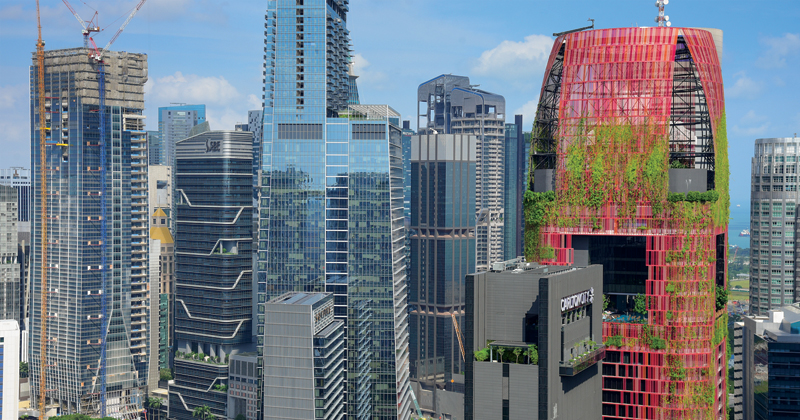Singapore is home to over 150 carbon services and trading firms, the highest concentration of carbon service providers in Southeast Asia. Leverage our vibrant ecosystem to drive new decarbonisation projects and capture emerging opportunities in carbon origination, services, and trading.
Browse all programmes and initiatives
-
All
-
Business Strategy
-
Talent Attraction & Development
Key Opportunities
-
Bold Climate Change Goals and Frameworks
-
Article 6 Implementation Agreements
-
Strong Participant Network of Energy and Commodity Traders
-
Proximity to Southeast Asia
-
International Aviation and Shipping Hub

Singapore is the first country in Asia to introduce a carbon tax. The carbon tax, introduced atS$5/tCO2e in 2019, will be raised to S$25/tCO2e in 2024 and 2025 and S$45/tCO2e in 2026 and 2027, with a view of further raising it to $50-80/tCO2e by 2030.
ICC Framework
In 2022, the Singapore government introduced the International Carbon Credit (ICC) Framework, which allows carbon tax-liable companies to use eligible ICCs to offset up to 5% of their taxable emissions from 1 Jan 2024.
Transition Framework
The Singapore government has also introduced a transition framework to support emissions-intensive trade-exposed (EITE) companies in adjusting to a low-carbon economy. This framework provides additional time for these companies to make the necessary investments for their transformation by offering transitory allowances for a portion of their emissions. Read more about Singapore’s Transition framework.

Under Article 6 of the Paris Agreement, countries can trade Internationally Transferred Mitigation Outcomes (ITMOs) to achieve their Nationally Determined Contributions (NDCs).
Singapore is pursuing cooperation with other countries under Article 6.2 of the Paris Agreement. To date, we have signed 10 Implementation Agreements (IAs) and are in discussions with more countries on similar agreements. Under these agreements, Singapore-based companies will be able to tap on Singapore’s growing network of Article 6.2 partnerships to access emerging opportunities in Article 6 markets.
Status of Singapore’s IAs
Signed IAs
- Bhutan
- Chile
- Ghana
- Mongolia
- Papua New Guinea
- Paraguay
- Peru
- Rwanda
- Thailand
- Vietnam
Signed MOUs on carbon market cooperation
- Latin America: Colombia, Costa Rica, Dominican Republic
- Asia: Cambodia, Laos, Malaysia, Philippines, Sri Lanka
- Africa: Kenya, Morocco, Senegal, Zambia
- Oceania: Fiji

As a global commodities trading hub, Singapore has over 400 global traders. These traders are well-positioned to leverage Singapore’s vibrant carbon ecosystem to diversify into carbon-related activities, especially in the areas of carbon credit origination and trading. These areas are complementary to traders’ existing core activities in Singapore, while also enabling them to gain access to carbon credits to decarbonise their supply chains.
Within Singapore’s ecosystem, close to 40 companies are actively trading in both compliance and voluntary markets. This includes independent traders (Trafigura, Mercuria, Vitol, Glencore), energy majors (Shell, ExxonMobil, BP, Chevron), natural resources companies (BHP, Rio Tinto), and agri-commodities companies (Agrocorp), all of whom have set up local carbon trading teams to capture opportunities within this space. Today, most teams engage in the trading of compliance credits for other jurisdictions, especially for New Zealand, Australia, and Japanese schemes, as well as voluntary credits from nature-based and tech-based solution projects.
To complement this growing network of energy and commodity traders establishing local carbon trading teams, there are four active carbon exchanges in Singapore (ACX, CIX, EEX, ICE). These exchanges provide robust infrastructure for carbon credit trading and price discovery.

Singapore is situated at the heart of global carbon trade flows. Our strategic location in Asia positions us close to both growing demand and supply of climate mitigation projects. Singapore is the hub for regional headquarters, with 46% of multinational companies’ Asia headquarters based in Singapore, many of whom have ambitious sustainability goals.
Singapore is also in close proximity to Southeast Asia which holds 30% of the world’s global nature-based solutions (NBS) potential, and is rich in renewable energy sources. Thus, Southeast Asia is well-placed to become a net exporter of carbon credits, attracting voluntary market players and carbon registries to set up their regional headquarters in Singapore.
Furthermore, there is opportunity for Singapore to serve as a base from which project developers can service projects across the region and bring the generated carbon credits back to Singapore for trade on a global scale.

Being an international aviation and shipping hub makes Singapore an attractive carbon credits trading destination for schemes such as Carbon Offsetting and Reduction Scheme for International Aviation (CORSIA). CORSIA is the first global, sectoral compliance scheme for the international civil aviation sector. From 2027 onwards, flight operators of all international flights will be mandated to purchase CORSIA-eligible carbon credits to offset emissions over a baseline. Read more about the CORSIA scheme.


.jpg)






